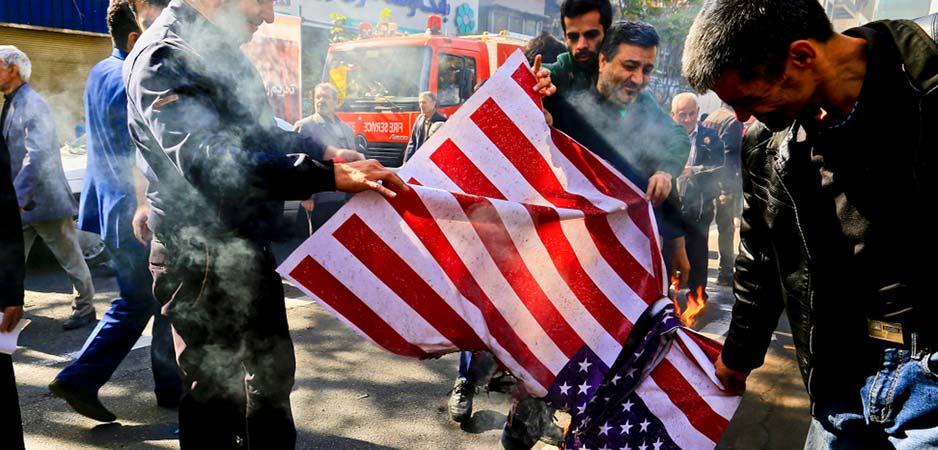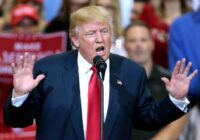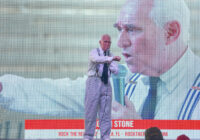At his speech on January 8 following the Iranian missile attack on Iraqi bases hosting American forces, US President Donald Trump announced, with his usual tone of self-congratulation, that “Iran appears to be standing down, which is a good thing for all parties concerned and a very good thing for the world.” The rest of the world is left wondering what this means.
On the same day, Prince Harry and his wife Meghan announced their intention to “step back” from their public role as front line royalty. Between what “appears to be” standing down and what was clearly announced as stepping back, the news cycle seems focused on acts of humility.
Here is today’s 3D definition:
Standing down:
Walking away from a confrontation, which has special meaning when the outlook is for war, but which turns out as often as not, in contexts of war to be a tactic of feigned retreat
Contextual Note
Has President Trump correctly described Iran’s attitude or his he just guessing? Or perhaps he was just making it up. Have Iran and the US achieved a point of equilibrium that allows either or both of them to “stand down”? Some of the media have described Trump’s speech as evidence that he is ready to back “away from further military conflict.” He already claimed, after the demolition of Iranian General Qassem Soleimani’s car, that “[t]he world is a safer place without these monsters.” On January 3, Soleimani was killed in a US drone strike at Baghdad airport in Iraq.
According to a USA Today/Ipsos poll, the American public refuses to believe either that the world is a safer place, that Iran has stood down or that Trump has backed away. We learn from the poll that “there was overwhelming agreement — in each case by more than 6-1 — that the attack [on Soleimani] made it more likely Iran would strike American interests in the Middle East (69%), that there would be terrorist attacks on the American homeland (63%), and that the United States and Iran would go to war (62%).”
Trump’s litany of accusations against Iran and his promise of “more punishing sanctions” sounds more like George W. Bush’s rhetoric in 2002, when he was preparing the US for his imminent invasion of Iraq. The Iranians were probably closer to the mark when they deemed the assassination of Soleimani to be “a declaration of war.”
Trump’s exact phrase describing Iran’s position was: “Iran appears to be standing down.” Whenever a politician like Trump introduces a description of an adversary’s actions with the verb “appear to,” the attentive observer should pay attention to the hyperreal dimension of their discourse. The president clearly needs to reassure the American public by claiming that he is not seeking war. But he also has to live up to the “manliness” required in US culture that means he must show himself as ready for war.
Business Insider far more realistically notes that “none of this means that the US and Iran are at peace or that their historic confrontation is over.” Confrontations do not necessarily lead to war or any form of open combat. But they do have a cost, especially when they become interminable, as US wars now tend to be.
Historical Note
The one thing most lucid observers should recognize is that the events of the past week mark a historical turning point. The stalemate in the Middle East that involves at its core essentially four influential nations — Iran, Saudi Arabia, Israel and the US — cannot continue as it has for the past two (or even four) decades. (Turkey and Russia should also be mentioned.) Of the four nations, the Iranians have identified the odd man out, the only country that has no geographical stake in the region. Iran’s discourse focuses on the concrete project of removing the US presence from the region, starting with Iraq.
The popular reaction to the Soleimani attack confirms that, while it is unlikely that the US will beat a retreat from the Middle East, the local populations in their great majority are increasingly receptive to the idea of an American withdrawal and, for the first time, believe it may be possible. The US has clearly overstayed its welcome in the Middle East.
Curiously, Trump himself appears to be hinting that the Iranians are right. By vaunting the fact that the US is now ” independent, and we do not need Middle East oil,” Trump indirectly justifies Iran’s demand that the US pull its troops out of the region. Though garbling the word “accomplishments” (which sounds, in his telling, like “accompliships”) Trump boasts about “historic accomplishments” in the form of “energy independence.” He somewhat surprisingly suggests, without giving any details, that there are new “strategic priorities — these are accomplishments that nobody thought were possible — and options in the Middle East.”
The real battle will be over Iran’s announced intention to abandon the Joint Comprehensive Plan of Action (JCPOA) — the 2015 Iran nuclear deal — and develop its nuclear arsenal. Some suspect that the super-hawks in the US, Israel and Saudi Arabia are secretly hoping that any even partially and imperfectly detected threat of Iranian nuclear capacity will justify a massive attack on Iran, at least on the scale of the 2003 invasion of Iraq. But, given the lessons from Iraq and the much higher stakes with Iran, even that looks more like a game of bluff than a serious plan of action.
The immediate question has focused on the continued US presence in Iraq. The Iraqi parliament has made it clear that the most immediate consequence of killing Soleimani on Iraqi soil is to require the definitive departure of all foreign forces from Iraq. This is a stunning development that the US establishment has trouble grappling with. Though the results have been consistently paltry, confusing and costly, the US has felt itself, despite the constant chaos, to be in control of events in Iraq for the past 17 years by virtue of having toppled Saddam Hussein in 2003. The shock to American egos of being told to leave cannot be overestimated. And the difficulty of finding a pretext for staying despite that shock has suddenly become immense.
Though the English translation leaves a lot to be desired, Iranian President Hassan Rouhani’s analysis is largely correct: “The Americans and the White House have no understanding of the region and recognised what a mistake they have made after their terrorist measure and following the uprising of regional nations and the unity that was created.” Americans do seem to have “recognized” the mistake — as has Republican Senator Rand Paul, who otherwise approves of Trump’s politics — but the Trump administration has not quite admitted it. More broadly, it is unlikely that the military-industrial establishment that now works more closely with the Democrats than the White House will ever admit it.
Business Insider concludes: “Iran and the US have seemingly stepped away from the brink of war, but the road to peace is still elusive.” One party is “standing,” though down. Or so it seems. The other is “stepping,” though away for the moment. At the same time, Harry and Meghan are stepping back. “Down,” “away,” “back.” It sounds like stage directions for what increasingly resembles a comedy that has drifted dangerously and unconsciously toward tragedy.
*[In the age of Oscar Wilde and Mark Twain, another American wit, the journalist Ambrose Bierce, produced a series of satirical definitions of commonly used terms, throwing light on their hidden meanings in real discourse. Bierce eventually collected and published them as a book, The Devil’s Dictionary, in 1911. We have shamelessly appropriated his title in the interest of continuing his wholesome pedagogical effort to enlighten generations of readers of the news.]
The views expressed in this article are the author’s own and do not necessarily reflect Fair Observer’s editorial policy.
Support Fair Observer
We rely on your support for our independence, diversity and quality.
For more than 10 years, Fair Observer has been free, fair and independent. No billionaire owns us, no advertisers control us. We are a reader-supported nonprofit. Unlike many other publications, we keep our content free for readers regardless of where they live or whether they can afford to pay. We have no paywalls and no ads.
In the post-truth era of fake news, echo chambers and filter bubbles, we publish a plurality of perspectives from around the world. Anyone can publish with us, but everyone goes through a rigorous editorial process. So, you get fact-checked, well-reasoned content instead of noise.
We publish 2,500+ voices from 90+ countries. We also conduct education and training programs
on subjects ranging from digital media and journalism to writing and critical thinking. This
doesn’t come cheap. Servers, editors, trainers and web developers cost
money.
Please consider supporting us on a regular basis as a recurring donor or a
sustaining member.
Will you support FO’s journalism?
We rely on your support for our independence, diversity and quality.






